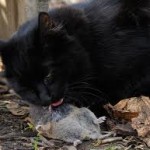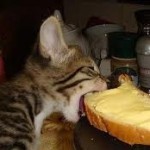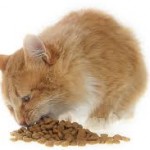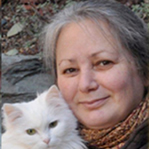We feed our cats canned food only (never dry) and they enjoy a little raw meat from time to time. Let’s look at why we do this.
 A natural diet for cats is three or four mice each day. This diet consists of 75% water, a good chunk of protein, a little fat, as well as vitamins and minerals. They consume their food raw in several small meals over the day.
A natural diet for cats is three or four mice each day. This diet consists of 75% water, a good chunk of protein, a little fat, as well as vitamins and minerals. They consume their food raw in several small meals over the day.
By contrast, manufacturers fill common commercial foods for cats with grains like corn, wheat, and even rice (which is a grain even though most people don’t call it that). It’s high in carbohydrate and cooked at a high temperature. And most cat owners keep the cat’s bowl filled and let the cat determine how much to eat, snacking whenever they want.
 We know cats won’t willingly eat grain. Think of the cats that guard the granary – they look for mice, not dried out kernels of corn. Nevertheless, if cat food manufacturers spray dry cereal with flavour enhancers, they can entice cats to eat it.
We know cats won’t willingly eat grain. Think of the cats that guard the granary – they look for mice, not dried out kernels of corn. Nevertheless, if cat food manufacturers spray dry cereal with flavour enhancers, they can entice cats to eat it.
 The problem with the grain diet is that it is high in carbohydrates. This changes their metabolism so they are prone to weight gain. This taxes the joints and leads to arthritis, but it can also predispose them to diabetes. When we diagnose diabetes in a fat cat, the owners are often surprised that they brought it on by feeding the wrong food.
The problem with the grain diet is that it is high in carbohydrates. This changes their metabolism so they are prone to weight gain. This taxes the joints and leads to arthritis, but it can also predispose them to diabetes. When we diagnose diabetes in a fat cat, the owners are often surprised that they brought it on by feeding the wrong food.
The solution is to feed cats with more natural, high protein, high fat, and low carbohydrate foods.
Feeding your cat four fat mice every day is probably inconvenient, so we need an alternate plan. You can make your own raw food, and this is fine as long as it’s balanced. Pet stores sell supplements that you can add to a meat source. There are also recipes on the Internet. There are also commercially prepared raw foods. These are balanced, and you can buy them frozen, ready for use.
Alternatively, what most people do is look for grain-free canned cat food, perhaps adding a little meat daily. Most cats will eat raw or cooked beef, pork, chicken, or turkey. You can also go with fish such as canned or cooked tuna or salmon. Meat by itself shouldn’t be the sole diet—it’s unbalanced. In addition, you do want to limit fish, especially if you have a cat with kidney issues.
 Some cats become intolerable when transitioning to a wet diet because they’re dry food addicts. For these cats, offer one-quarter cup of grain-free, good quality kibble at bedtime to help satisfy them, and gradually reduce it over time.
Some cats become intolerable when transitioning to a wet diet because they’re dry food addicts. For these cats, offer one-quarter cup of grain-free, good quality kibble at bedtime to help satisfy them, and gradually reduce it over time.
The other issue with cats is water. Cats are desert animals and they generally dislike drinking. Insufficient water intake leads to chronic dehydration. This can create problems with crystal formation in the urine, and it can aggravate kidney insufficiency.
We see the first problem in younger cats. The urine becomes overly concentrated and crystals form. These crystals can trigger bladder irritation and infections, but they can also cause life-threatening blockages.
In older cats, we often see kidney deterioration where the kidneys can’t get rid of toxins. These cats produce an incredible amount of urine and they can easily become dehydrated, which makes them ill.
The solution is to boost water intake. The first step is to transition to an all canned (or wet) diet. If this isn’t enough, we get owners to slowly add water to the wet food (meat or canned) they are offering. Ideally, we want to boost the water intake so that we don’t see the cat drinking. The litter box should also be heavy with urine.
Dr. Louise Janes D.V.M. & Dr. Jeff Grognet D.V.M
 Mid-Isle Veterinary Hospital
Mid-Isle Veterinary Hospital
5-161 Fern Road West
Qualicum Beach, BC
Tel (250) 752-8969
See all articles by Dr. Louise Janes D.V.M. & Dr. Jeff Grognet D.V.M.




